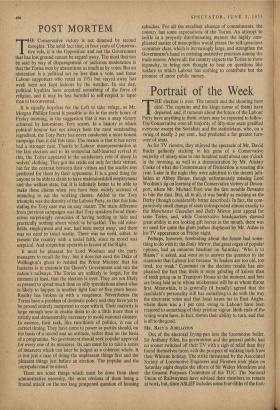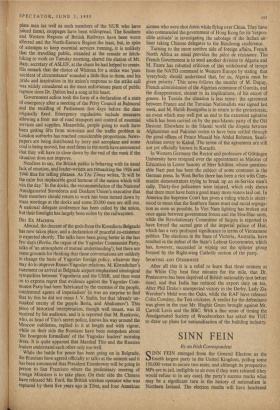Portrait of the Week
THE election is over. The tumult and the shouting have died. The captains and the kings (some of them) have departed, and, if rumours about the future of the Labour Party have anything in them, others may be expected to follow. The Conservative over-all majority of fifty-nine seats gratified everyone except the Socialists and the statisticians. who, on a swing of nearly 2 per cent., had predicted a far greater turn- over of seats.
As for TV viewers, they enjoyed the spectacle of Mr. David Butler gallantly sticking to his guns of a Conservative majority of ninety-nine to one hundred until about one o'clock in the morning, as well as a demonstration by Mr. Alistair Cooke of what the Commentator of Distinction is wearing this year. Later in the night they were admitted to the decent jubi- lation at Abbey House, though unfortunately missing Lord Woolton's jig on learning of the Conservative victory at Devon- port, where Mr. Michael Foot was the first notable Bevanite to bite the dust. But, all in all, it was hardly as exciting as the Derby (though considerably better described). In fact, the com- paratively small change of seats corresponded almost exactly to the Manchester Guardian and Daily Mirror joint appeal for tame Tories, and, while Conservative headquarters showed great ability in not looking gift horses in the mouth, there was no need for quite the glum pathos displayed by Mr. Attlee in his TV appearance on Friday night.
Perhaps, however. foreboding about the future had some- thing to do with it; the Daily Mirror, that great organ of popular opinion, had an ominous headline on Saturday. `Who is to Blame?' it asked, and went on to answer the question by the statement that Labour lost because 'its leaders are too old, too tired, too weak.' Comment on the election results has em- phasised the fact that there is more grinding of knives than of teeth going on in Transport House at the moment, and bets are being laid as to whose snickersnee will be at whose throat first. Meanwhile, it is generally (if banally) agreed that the candidate's personality still has something to do with the way the electorate votes and that local issues (as in East Anglia, where there' was a 1 per cent. swing to Labour) have been restored to something of their pristine vigour. Both ends of the voting worm have, in fact, shown their ability to turn, and that is all to the good. plate men (as well as such members of the NUR who have joined them), stoppages have been widespread. The Southern and Western Regions of British Railways have been worst affected and the North-Eastern Region the least, but, in spite of attempts to keep essential services running, it is unlikely that the travelling public, stranded at the seaside or hitch- hiking to work on Tuesday morning, shared the elation of Mr. Baty, secretary of ASLEF, at the chaos he had helped to create. His remark that the choice of Whitsun for a strike was 'pure accident of circumstance' sounded a little thin to them, and his pride and inspiration in his union's response to the strike call was widely considered as the most unfortunate piece of public rapture since Dr. Dalton had a song in his heart. Government action took the form of a declaration of a state of emergency after a meeting of the Privy Council at Balmoral and the recalling of Parliament • five days before the date originally fixed. Emergency regulations include measures allowing a freer use of road transport and control of essential services and supplies. Meanwhile, people going to work have been getting lifts from motorists and the traffic problem in London surburbs has reached considerable proportions. News- papers are being distributed by lorry and aeroplane and some coal is being moved, but steel firms in the north have announced that they will have to close down by the end of the week if the situation does not improve.
Needless to say, the British public is behaving with its usual lack of emotion, and leader-writers are ransacking the 1926 and 1940 files for telling phrases. As The Times writes, 'It will be the calm but implacable good humour of the nation which will win the day.' In the docks, the recommendation of the National Amalgamated Stevedores and Dockers Union's executive that their members should return to work has been turned down by mass meetings at the docks and some 20,000 men are still out. A national delegate conference has been called by the union, but their limelight has largely been stolen by the railwaymen.
DEI Ex MACHINA Abroad, the descent of the gods from the Kremlin to Belgrade has now taken place, and a declaration of peaceful co-existence is expected shortly. The talks have been going better in the last few days (Borba, the organ of the Yugoslav Communist Party. talks of 'an atmosphere of mutual understanding'), but there are some grounds for thinking that these conversations are unlikely to change the basis of Yugoslav foreign policy, whatever they may do to improve Russo-Yugoslav relations. M. Khrushchev's statement on arrival at Belgrade airport emphasised ideological sympathies between Yugoslavia and the USSR, and then went on to express regret that evidence against the Yugoslav Com- munist Party had been 'fabricated by the enemies of the people, condemned agents of imperialism' (it was no surprise to find that by this he did not mean J. V. Stalin, but that 'already un- masked enemy of the people Beria, and Abakumov'). This piece of historical interpretation, though well meant, was ill received by his audience, and it is reported that M. Rankovic, who, as head of Tito's secret police, knows his way around the Moscow oubliettes, replied to it at length and with vigour, while on their side the Russians have been outspoken about 'the bourgeois formalism' of the Yugoslav leaders' morning dress. It is quite apparent that Marshal Tito and the Russian leaders understand each other only too well.
While the battle for peace has been going on in Belgrade, the Russians have agreed officially to talks at the summit and it has been announced that President Eisenhower will be going in person to San Francisco where the preliminary meeting of foreign Ministers is to take place. On their side the Chinese have released Mr. Ford, the British wireless operator who was captured by them five years ago in Tibet, and four American airmen who were shot down while flying over China. They have also commended the government of Hong Kong for its 'respon- sible attitude' in investigating the sabotage of the Indian air- liner taking Chinese delegates to the Bandoeng conference.
Turning to the more sombre side of foreign affairs. French North Africa as usual provides the piece de resistance. The French Government is to send another division to Algeria and M. Faure has rebutted criticism of this withdrawal of troops from the NATO command in Western Europe by stating that 'everybody should understand that, for us, Algeria must be given priority.' This news follows the murder of M. Dupuy, French administrator of the Algerian commune of Guentis, and the disappearance, sinister in its implications, of his escort of goums. In Tunisia the situation is less tense : the agreement between France and the Tunisian Nationalists was signed last week, and M. Habib Bourguiba is to return to the protectorate, an event which may well put an end to the extremist agitation which has been carried on by the pan-Islamic party of the Old Destour. Elsewhere in the Islamic world the dispute between Afghanistan and Pakistan seems to have been settled through the good offices of Prince Musaid bin Abdul Rehman, Saudi- Arabian envoy to Kabul. The terms of the agreement are still not yet officially known in Karachi.
In Western Germany the Rector and professors of Gottingen University have resigned over the appointment as Minister of Education in Lower Saxony of Herr Schluter, whose question- able Nazi past has been the subject of some comment in the German press. In West Berlin there has been a riot with Com- munist demonstrators trying to break up an ex-Service men's rally. Thirty-five policemen were injured, which only shows that there must have been a good many more rioters laid out. In America the Supreme Court has given a ruling which is under- stood to mean that the Southern States must end racial segrega- tion as soon as possible. In Viet Nam fighting has broken out once again between government forces and the Hoa-Hao sects, while the Revolutionary Committee of Saigon is reported to have forced the sacred gate of the imperial palace of Hu& which has a very profound significance in terms of Vietnamese politics. The elections in the State of Victoria, Australia, have resulted in the defeat of the State's Labour Government, which has, however, succeeded in wiping out the splinter group formed by the Right-wing Catholic section of the party.
SPORTING AND OTHERWISE
After all this it is a relief to learn that three runners at the White City beat four minutes for the mile, that Dr. Pontecorvo has been deprived of British nationality (not before time), and that India has reduced the export duty on tea. After Phil Drake's unexpected victory in the Derby, Lady Zia Wernher's Meld won the Oaks, while the RAF have released Colin Cowdrey, the Test cricketer. A verdict for the defendants was given in the case Mr. Hughie Green brought against Mr. Carroll Levis and the BBC. With a fine sense of timing the Amalgamated Society of Woodworkers has asked the TUC to draw up plans for nationalisation of the building industry.



































 Previous page
Previous page